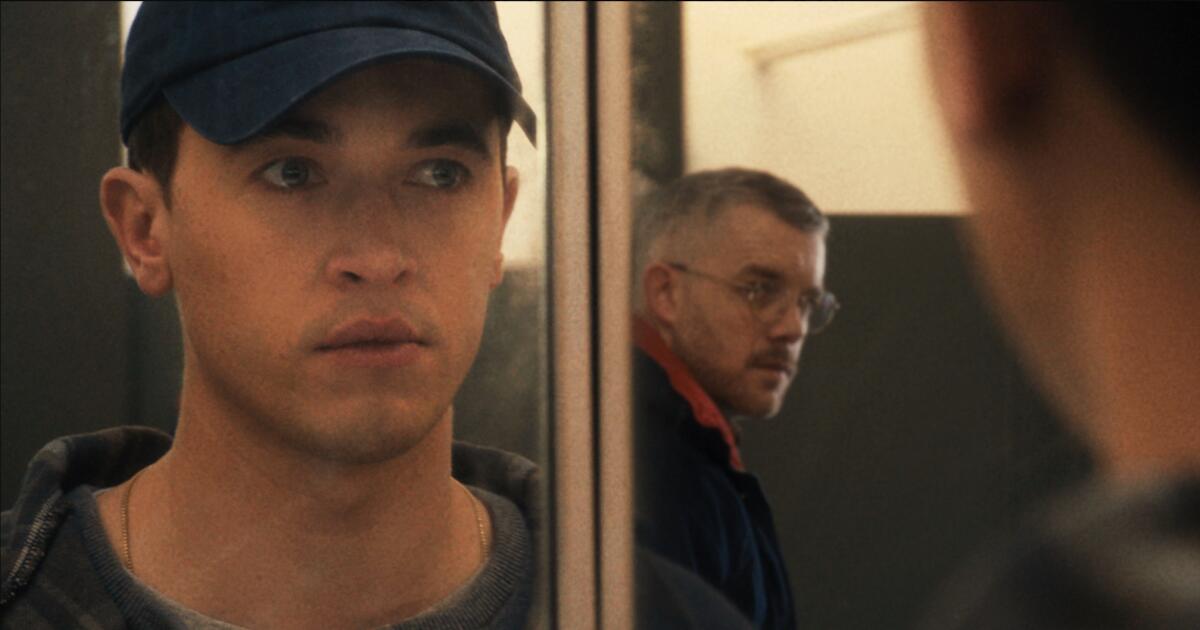In 1997, the comedy “In & Out” did its shiny, star-studded best to mainstream the story of a closeted gay man in a rock-ribbed American community embracing his truth. The fine new indie drama “Plainclothes,” which takes place in 1997 in Syracuse, N.Y., and centers on a young police officer in the throes of desire, wants to remind us that the reality of such reckonings was a bit more fraught.
In first-time screenwriter-director Carmen Emmi’s tense, sensitively threaded scenario, fresh-faced cop Lucas (Tom Blyth) isn’t just holding a secret — he’s involved in the enforced criminalization of it. His assigned undercover detail is the mall, using a seductive look (not entirely acting) to lure gay men to the restroom, silently clocking the moment they meet the minimum requirement for breaking indecent exposure laws, then having them arrested.
Something shifts inside Lucas during one of these stings, however, when he locks eyes with a target named Andrew (Russell Tovey), whose soulful return gaze promises a deeper connection than instant gratification. He spares Andrew the planned indignity waiting outside, but secures a phone number away from the watchful eye of his sergeant (Christian Cooke). Weeks later, the pair arrange to meet in the upstairs balcony of an old movie palace. (Though we never see the screen, sharp-eared film buffs will recognize allusions to Francis Ford Coppola’s 1974 surveillance classic “The Conversation.”) After a couple of warm, intimate exchanges in secluded spaces, Lucas allows himself to imagine a future free from hiding, even if Andrew cautions that what they have can only ever be temporary.
Early in “Plainclothes,” thanks to changes in aspect ratio and Lucas’ facial hair, we realize that this timeline amounts to an extended memory, triggered in the present scenes by tense New Year’s Eve preparations at Lucas’ childhood home and a misplaced letter that he hopes neither his adoring, recently widowed mother (a wonderful Maria Dizzia) nor his obnoxious, hot-headed uncle (Gabe Fazio) find.
The backward-forward structure creates entwined tracks of suspense between the outcome of the Andrew relationship and the expected ramifications of what’s assumed to be a revealing letter. That framework gives “Plainclothes” the feeling of an emotional chase film where pursuer and pursued are the same, stuck in a loop of possibility, torn about what being caught really means.
Emmi’s well-conceived screenplay does justice to the ways a compartmentalized life can crack. When Lucas is with Andrew — and even in scenes with a nice ex-girlfriend (Amy Forsyth) — acceptance is palpable, understanding real. Among family, the pressure to conform activates his guardedness. And when his department, steeped in macho culture and eager for more mall arrests, starts deploying a video camera behind a one-way mirror, an increasingly anxious Lucas is made to feel nothing but risk about his identity.
There may be little that’s psychologically fresh about “Plainclothes,” but the fact that its low-key, close-framed style suggests a taut, moody gay indie you might have seen in the ’90s works in its favor. It’s also well cast, with the appealing Blyth always in control of the undercurrents, especially alongside the excellent Tovey, playing a sadder, wiser closetedness. I wish Emmi hadn’t overegged the visual motif that Lucas’ POV in moments of stress is akin to the fuzzy texture of Hi8 video: A little of it goes a long way and too often pulls us out of the tone in a room. But it’s the kind of choice that’s easier to forgive in a movie so well-attuned to shifts in perception, one that dimensionalizes the problem of achieving clarity when leading a double life.
‘Plainclothes’
Not rated
Running time: 1 hour, 35 minutes
Playing: Opens Friday, Sept. 26, at Landmark Sunset
